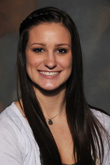Student Profile: Lauren Forrest
 Psychology student Lauren Forrest has kept herself busy since her arrival at the U
back in 2008. Not only has she been a peer advisor for the psychology department,
a student ambassador for the College of Social and Behavioral Science, and served
as a research assistant to Dr. David Strayer in the Applied Cognition Lab for distracted
driving, but she has dedicated time to her own research on body image and eating disorders.
When asked how she manages to stay on top of everything, she says, “I am passionate
about school. I feel like everything I do is working to enhance and expand my intellect
and experience so that I can learn as much as I can in order to someday help as many
people as I can.”
Psychology student Lauren Forrest has kept herself busy since her arrival at the U
back in 2008. Not only has she been a peer advisor for the psychology department,
a student ambassador for the College of Social and Behavioral Science, and served
as a research assistant to Dr. David Strayer in the Applied Cognition Lab for distracted
driving, but she has dedicated time to her own research on body image and eating disorders.
When asked how she manages to stay on top of everything, she says, “I am passionate
about school. I feel like everything I do is working to enhance and expand my intellect
and experience so that I can learn as much as I can in order to someday help as many
people as I can.”
Motivated by her own family’s psychological health, Forrest knew that she wanted to go into psychology early in her college career. “I like that psychology is applicable in every situation in which you find yourself. I feel like it is constantly surrounding me and I love that I can learn about it outside of the classroom by simply observing and interacting with others,” she says.
Forrest found the inspiration for her thesis project and original research project in her second semester of college. She explains the driving factors behind her research by saying, “Anorexia nervosa has the highest mortality rate of any mental illness. Eating disorder prevalence is increasing and the average age of onset is decreasing. These are serious problems that are very under-researched in my opinion. I want to make a difference in this field of study by broadening the understanding of the development, treatment, and prevention of these disorders.”
Along with performing research, Forrest has served as a student ambassador since 2010. She explains the importance of the team by saying, “In the university there’s kind of a gap between the professors, staff, and the students. Implementing this team was a way of bridging the gap and creating a sense of community. I’m a huge believer that people want to feel related to other people, and this was one way to make that happen.” When discussing the benefits of having a student ambassador team, she says, “We’re all so different. Everyone had their own connections in each of the departments and we were able to utilize them to execute different events and projects.”
Forrest was also a peer advisor for the department of psychology, “I like advising because I am able to help students feel confident about their academics and their plans for their futures.”
When asked how her experience was during her time here, Forrest says, “I have grown so much in the past four years and I can’t even believe how wonderful my life has been at this university. I have been truly lucky to have some of the academic opportunities that I have had and to have had so many different people take an interest in me by investing their efforts into helping me succeed.” And of those people who took an interest in her, she specifically recognizes Dean David Rudd and her thesis advisor, Dr. Jeanine Stefannuci for their contributions. “Because he has his PhD in clinical psychology and I want my PhD in clinical psychology, Dean Rudd has served as a mentor to me and it was really great to work with him. And Dr. Stefanucci has been absolutely amazing. She let me do my own thing with my research, she was there when I needed her help, and she was always offering her help. She was the absolute perfect advisor.”
With regards to how she feels about graduating in May with her bachelor’s, Forrest says, “I’m planning on getting a PhD so it’s a stepping stone. I still have about seven years left before I’m done with school.” And although she’s undecided in her future plans, she says, “When I’m finished with school, I want to be a therapist for individuals with eating disorders. I will have my PhD, so I will also be trained in research. My goal is to practice in the treatment and then be able to develop research questions that could further improve the practice of treatment. Essentially, I want to bridge the notorious research-practice gap, having my research and practices inform and influence one another.”
Forrest’s advice to students interested in making the most of their college years is to get involved. “There are so many things to do, so the way you benefit from it is by doing a kind of soul search. Take a few classes in different areas to find what you’re really passionate about and then throw yourself into that department and that college. Also, talk to your advisor about opportunities on campus. It really comes down to your individual interests, but there’s something for everyone here.”
